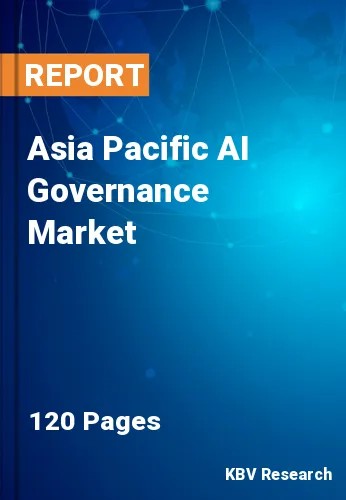Chapter 1. Market Scope & Methodology
1.1 Market Definition
1.2 Objectives
1.3 Market Scope
1.4 Segmentation
1.4.1 Asia Pacific AI Governance Market, by Component
1.4.2 Asia Pacific AI Governance Market, by Vertical
1.4.3 Asia Pacific AI Governance Market, by Organization size
1.4.4 Asia Pacific AI Governance Market, by Deployment Mode
1.4.5 Asia Pacific AI Governance Market, by Country
1.5 Methodology for the research
Chapter 2. Market Overview
2.1 Introduction
2.1.1 Overview
2.1.1.1 Market Composition & Scenario
2.2 Key Factors Impacting the Market
2.2.1 Market Drivers
2.2.2 Market Restraints
Chapter 3. Competition Analysis - Global
3.1 KBV Cardinal Matrix
3.2 Recent Industry Wide Strategic Developments
3.2.1 Partnerships, Collaborations and Agreements
3.2.2 Product Launches and Product Expansions
3.2.3 Acquisition and Mergers
3.3 Market Share Analysis, 2021
3.4 Top Winning Strategies
3.4.1 Key Leading Strategies: Percentage Distribution (2018-2022)
3.4.2 Key Strategic Move: (Partnerships, Collaborations & Agreements: 2018, Apr – 2022, Sep) Leading Players
Chapter 4. Asia Pacific AI Governance Market by Component
4.1 Asia Pacific Solution Market by Country
4.2 Asia Pacific Services Market by Country
Chapter 5. Asia Pacific AI Governance Market by Vertical
5.1 Asia Pacific BFSI Market by Country
5.2 Asia Pacific Healthcare & Lifesciences Market by Country
5.3 Asia Pacific Media & Entertainment Market by Country
5.4 Asia Pacific IT & Telecom Market by Country
5.5 Asia Pacific Retail Market by Country
5.6 Asia Pacific Government Market by Country
5.7 Asia Pacific Automotive Market by Country
5.8 Asia Pacific Other Vertical Market by Country
Chapter 6. Asia Pacific AI Governance Market by Organization size
6.1 Asia Pacific Large Enterprises Market by Country
6.2 Asia Pacific SMEs Market by Country
Chapter 7. Asia Pacific AI Governance Market by Deployment Mode
7.1 Asia Pacific On-premise Market by Country
7.2 Asia Pacific Cloud Market by Country
Chapter 8. Asia Pacific AI Governance Market by Country
8.1 China AI Governance Market
8.1.1 China AI Governance Market by Component
8.1.2 China AI Governance Market by Vertical
8.1.3 China AI Governance Market by Organization size
8.1.4 China AI Governance Market by Deployment Mode
8.2 Japan AI Governance Market
8.2.1 Japan AI Governance Market by Component
8.2.2 Japan AI Governance Market by Vertical
8.2.3 Japan AI Governance Market by Organization size
8.2.4 Japan AI Governance Market by Deployment Mode
8.3 India AI Governance Market
8.3.1 India AI Governance Market by Component
8.3.2 India AI Governance Market by Vertical
8.3.3 India AI Governance Market by Organization size
8.3.4 India AI Governance Market by Deployment Mode
8.4 South Korea AI Governance Market
8.4.1 South Korea AI Governance Market by Component
8.4.2 South Korea AI Governance Market by Vertical
8.4.3 South Korea AI Governance Market by Organization size
8.4.4 South Korea AI Governance Market by Deployment Mode
8.5 Singapore AI Governance Market
8.5.1 Singapore AI Governance Market by Component
8.5.2 Singapore AI Governance Market by Vertical
8.5.3 Singapore AI Governance Market by Organization size
8.5.4 Singapore AI Governance Market by Deployment Mode
8.6 Malaysia AI Governance Market
8.6.1 Malaysia AI Governance Market by Component
8.6.2 Malaysia AI Governance Market by Vertical
8.6.3 Malaysia AI Governance Market by Organization size
8.6.4 Malaysia AI Governance Market by Deployment Mode
8.7 Rest of Asia Pacific AI Governance Market
8.7.1 Rest of Asia Pacific AI Governance Market by Component
8.7.2 Rest of Asia Pacific AI Governance Market by Vertical
8.7.3 Rest of Asia Pacific AI Governance Market by Organization size
8.7.4 Rest of Asia Pacific AI Governance Market by Deployment Mode
Chapter 9. Company Profiles
9.1 Microsoft Corporation
9.1.1 Company Overview
9.1.2 Financial Analysis
9.1.3 Segmental and Regional Analysis
9.1.4 Research & Development Expenses
9.1.5 Recent strategies and developments:
9.1.5.1 Partnerships, Collaborations, and Agreements:
9.1.5.2 Acquisition and Mergers:
9.1.6 SWOT Analysis
9.2 Google LLC (Alphabet Inc.)
9.2.1 Company Overview
9.2.2 Financial Analysis
9.2.3 Segmental and Regional Analysis
9.2.4 Research & Development Expense
9.2.5 Recent strategies and developments:
9.2.5.1 Partnerships, Collaborations, and Agreements:
9.2.5.2 Product Launches and Product Expansions:
9.2.5.3 Acquisition and Mergers:
9.2.6 SWOT Analysis
9.3 IBM Corporation
9.3.1 Company Overview
9.3.2 Financial Analysis
9.3.3 Regional & Segmental Analysis
9.3.4 Research & Development Expenses
9.3.5 Recent strategies and developments:
9.3.5.1 Product Launches and Product Expansions:
9.3.5.2 Acquisition and Mergers:
9.3.5.3 Geographical Expansions:
9.3.6 SWOT Analysis
9.4 SAP SE
9.4.1 Company Overview
9.4.2 Financial Analysis
9.4.3 Segmental and Regional Analysis
9.4.4 Research & Development Expense
9.4.5 Recent strategies and developments:
9.4.5.1 Acquisition and Mergers:
9.4.6 SWOT Analysis
9.5 Amazon Web Services, Inc. (Amazon.com, Inc.)
9.5.1 Company Overview
9.5.2 Financial Analysis
9.5.3 Segmental Analysis
9.5.4 Recent strategies and developments:
9.5.4.1 Partnerships, Collaborations, and Agreements:
9.5.5 SWOT Analysis
9.6 Salesforce.com, Inc.
9.6.1 Company Overview
9.6.2 Financial Analysis
9.6.3 Regional Analysis
9.6.4 Research & Development Expense
9.6.5 Recent strategies and developments:
9.6.5.1 Partnerships, Collaborations, and Agreements:
9.6.6 SWOT Analysis
9.7 Meta Platforms, Inc.
9.7.1 Company Overview
9.7.2 Financial Analysis
9.7.3 Segmental and Regional Analysis
9.7.4 Research & Development Expenses
9.7.5 Recent strategies and developments:
9.7.5.1 Partnerships, Collaborations, and Agreements:
9.8 SAS Institute, Inc.
9.8.1 Company Overview
9.8.2 Recent strategies and developments:
9.8.2.1 Partnerships, Collaborations, and Agreements:
9.9 Tibco Software, Inc. (Vista Equity Partners)
9.9.1 Company Overview
9.9.2 Recent strategies and developments:
9.9.2.1 Product Launches and Product Expansions:
9.10. QlikTech International AB
9.10.1 Company Overview

